Positive signs after the embryo transfer are always something you are trying to notice. Embryo transfer can be overwhelming for you; sometimes you’re not even sure if you feel any different.
I am sure that you’re more than familiar with the whole procedure of embryo transfer if you’re looking for positive signs, but in this article, I will go over some important things that will help you to completely understand this procedure.
Besides, maybe you’re reading this because you’re preparing for this procedure.
What Is Embryo Transfer?
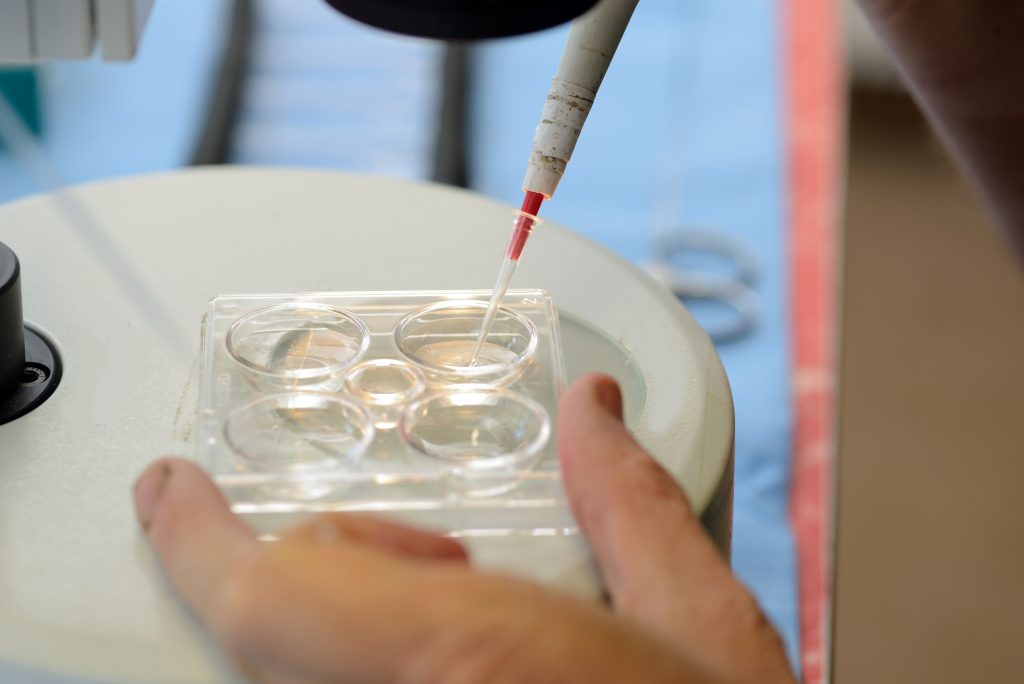
Embryo transfer represents the last part of in-vitro fertilization. It means that the embryo, aka fertilized egg, is transformed inside the uterus. If this step is successful, that means you will become pregnant.
One important fact about embryo transfer you should know is that more than one embryo is usually transformed in your uterus. That’s why it’s common to become pregnant with twins or triplets after in-vitro fertilization.
Embryo transfer is the least uncomfortable part of this whole process. There is no pain at all, so if you’re preparing for this step, don’t worry. You won’t feel a thing.
If you’ve already had your embryo transfer, you probably know what to expect. There are a few different kinds of embryos that can be transferred. So, we’ll mention those different types and explain the main difference.
Frozen Embryo
The frozen embryo is the type that is often used. When retrieving the egg, there are usually more of them. For that reason, there is a chance of creating more fertilized eggs simultaneously. Egg freezing is recommended by many experts.
That means that the woman doesn’t have to go through the phase of taking fertility medication and egg retrieval again. If needed, she will have additional frozen embryos for transfer.
Since the number of fertilized eggs can be high, it’s a routine to freeze them and save them for the next use. The frozen embryo can be saved for 10 or more years.
The good thing about a frozen embryo is the fact that it’s possible to test it for future anomalies or genetic disorders before transferring it to the uterus. In some countries, it’s possible to donate your embryo to someone else. Egg donation and sperm donation are also popular nowadays.
Fresh Embryo
A fresh embryo is the type of embryo that is transferred to the uterus 3 to 5 days after fertilization. So, after the retrieval of an egg from the woman, fertilization happens, and the embryo is monitored for a few days and then is placed inside the woman’s uterus.
Single Embryo Transfer and Multiple Embryo Transfer
As I’ve mentioned before, transferring more than one embryo is more common. A single embryo can also be transferred, but the chances of pregnancy are lower. Multiple embryo transfer has a higher chance of success.
What Are Positive Signs After Embryo Transfer
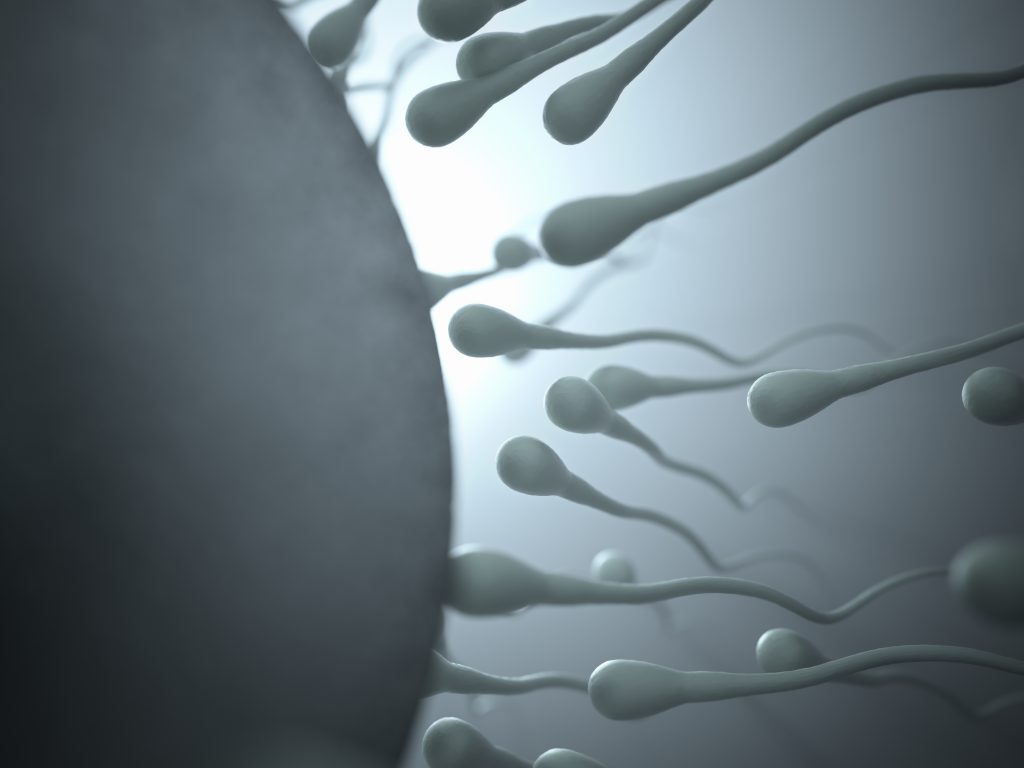
When it comes to noticing embryo transfer symptoms and signs, there are a few things you should pay attention to. I will tell you more about the positive signs after an embryo transfer in general and day-by-day symptoms after embryo transfer. So, let’s dive into it.
Spotting and Bleeding
Spotting and bleeding do not sound promising or positive at all. Blood is usually not something we want when we’re fighting infertility. However, this is a very good symptom after embryo transfer. Spotting or bleeding is a sign that the embryo has attached to the surface of your uterus (endometrium). In other words, the implantation has happened.
However, it’s possible that your spotting or bleeding is a consequence of your fertility drugs. That’s why it’s important to pay attention to other symptoms.
Cramps
Another positive symptom after embryo transfer is cramping. Mild cramping occurs because the embryo is attached to the endometrium of the uterus. These cramps are similar to those your experience when having your period.
There is a slight chance that your cramps are caused by the treatment. A small percentage of women can have cramps after going through certain pelvic and vaginal procedures.
Sore Breasts
The feeling of having sore breasts after embryo transfer is similar to the feeling of sore breasts during puberty or period. Breasts become sore because of the higher hormone levels. Estrogen and progesterone are elevated, and that’s causing sore breasts.
Besides being sore, they can also be sensitive to touch and even painful. Try to avoid pressing or touching them while they are tender like this.
Nausea
Nausea is a positive sign of pregnancy. Therefore, nausea could be the positive sign you’re looking for. Since there is a change in your hormone balance, and your progesterone and estrogen are elevated, it’s normal to feel different and aggravated.
However, nausea usually comes as a symptom in the second month of pregnancy. That’s why it’s important to check with your doctor about what’s causing your nausea.
Fatigue, Tiredness, Exhaustion
This is also one of the positive signs after embryo transfer. However, be careful because it can also be a side effect of your fertility medications.
Feeling tired before and during pregnancy is normal. It’s even more common at the beginning of your pregnancy because your elevated progesterone levels are causing you to be sleepy. Fatigue is nothing to be scared of. Just take some rest and relax. It’s all normal.
Different Vaginal Discharge
If you notice changes in vaginal discharge, that could be a good sign. If there is more vaginal discharge than before, and it’s white, that could be an early sign of pregnancy.
It’s important to be careful when determining changes in your discharge. If you’re not pregnant, the change could be a side effect of fertility treatments. However, if it’s smelly, weird-colored and you feel discomfort, you should see a doctor. Maybe you have some sort of infection.
Bloating
Bloating can also be a side effect of fertility drugs or a sign of early pregnancy. Elevated hormone levels (estrogen and progesterone) in your body affect your digestive system and your abdomen feels bloated and full.
Frequent Urination
Pregnant ladies are famous for their constant need to go to the bathroom. This happens because of the hCG hormone in your body, also known as “pregnancy hormones”.
Increased urination can also be due to anxiety and stress. Also, you need to make sure that increased urination is not a sign of urinary tract infection (UTI). Listen to your body.
No Period – Menstruation
A missed period is also one of the most famous and common signs of early pregnancy. So, if you were expecting your period and it’s not coming, your embryo transfer and implantation could have been successful. A missed period is one of the most common symptoms after a successful embryo transfer.
Headache and Hot Flashes
Headaches and hot flashes can be a sign of early pregnancy. Then again, the hormonal changes that cause this can be because of the fertility drugs, not pregnancy.
No Symptoms
Having no symptoms can also be a symptom of successful embryo transfer and implantation. As you can see, most of these positive signs after embryo transfer can also be a side effect of fertility medications, stress, or some other imbalance.
It’s not uncommon that women don’t feel a thing, and they are pregnant. That’s why it’s important to relax and let it go. Of course, you will watch over your body just like you did before. However, don’t be obsessed with anything.
It’s about two weeks to wait to know for sure was the embryo transfer successful. Until then, try to avoid stress and use every opportunity to take a break and rest in case pregnancy happens.
After Embryo Transfer – Day By Day Symptoms

If you’re interested in deciphering the whole process of embryo transfer, it would be good to learn more about the day-by-day symptoms after embryo transfer.
Days 1 and 2
The blastocyst, or to put it more simply, the embryo, leaves its shell, and that process is called hatching. After that, the process of attaching to the endometrium of the uterus (the wall of your womb) begins.
The embryo starts to grow in the first two days. During these days, you may feel cramps in your abdomen. Also, light fatigue, bloating, and fatigue are possible.
Days 3 and 4
On day 3, the implantation of the embryo begins. It means that the embryo has attached to the wall of your womb, and now it’s trying to implant itself deeper and deeper into the uterine lining. During these days, you could experience spotting and bleeding.
Day 5
On day 5, the process of implantation is complete. It means that the embryo has implanted itself into your womb completely. The production of cells that will later be the fetus and placenta begins.
During these days, it’s also possible to experience light bleeding, cramps, frequent urination, and sore breasts.
Day 6
The production of the pregnancy hormone – hCG begins on the sixth day. This hormone is produced by your body as a result of the growing embryo. It’s possible to experience fatigue and changes in vaginal discharge.
Days 7 and 8
The embryo is successfully growing and developing, which means that more of the hCG hormone is produced and released into your bloodstream. You may feel tired and sleepy.
Day 9
On the ninth day, levels of the hCG hormone are usually high enough to detect successful pregnancy. If the pregnancy test is negative, it may be a false negative, and it should be repeated after one or two days. The pregnancy test you will be taking is a beta pregnancy test.
A beta pregnancy test is performed by taking a blood sample and testing it for hCG hormone. Because of this, it’s the most reliable pregnancy test.
Keep in mind that it takes up to two weeks to ensure the embryo transfer is successful. So, don’t lose hope of seeing a positive pregnancy test.
All these day-by-day symptoms after the embryo transfer are also common during the whole pregnancy. Again, if you don’t have any of these symptoms, it doesn’t mean that the transfer was not a success.
Many pregnant women have no symptoms at all during the whole pregnancy, not just in the beginning. If you are pregnant, it’s time to take care of yourself and follow the doctor’s suggestions. The first three months of the pregnancy are the most critical, so it’s important to be careful during this period.
You will be monitored more than someone who conceived naturally, so be prepared to go to your doctor often.
Your first ultrasound as another form of a pregnancy test should be performed between weeks 5 and 7 or between weeks 3 and 5 after the embryo transfer. This event is usually very emotional for the moms, so prepare some tissues for your doctor’s appointment.
In Vitro Fertilization – IVF Treatment
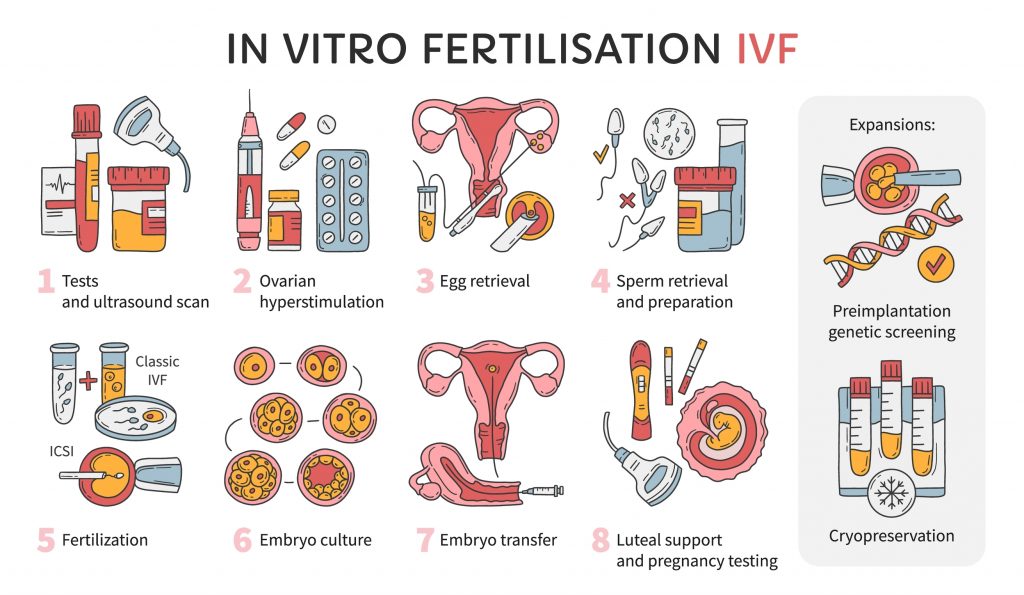
If you’re just reading about everything that is connected with embryo transfer, I would like to give you some additional information about the IVF cycle in general.
In vitro is a fertility treatment where a woman’s egg and a man’s sperm are combined outside of the body – “in a glass”. The procedure is done by professionals, in a laboratory.
However, before the IVF treatment itself, some steps need to be done. If you’re thinking about IVF treatment, you have to know that IVF procedure includes a lot of fertility medications.
Usually, you’re given medication that will stop your natural menstrual cycle. Then, you will have to use medications that boost egg production in the ovaries. After that, if there are enough eggs, you will be prescribed medications that should stop early/premature ovulation.
Additionally, you will have to use medications to prepare your uterus. Since the fertilized egg has to attach to the wall of your uterus, it’s important to create a “friendly environment”.
After retrieving the eggs, it’s time to fertilize them with sperm. When it comes to men, it’s much simpler. There are no medications, but it’s essential to live a healthy lifestyle.
So, before going through the process of the IVF cycle, it’s important to eat healthy and remove bad habits from life. Smoking and drinking are enemies of the sperm. It’s good to use some natural supplements to improve the quality of the semen.
After combining the egg and the sperm, the embryo is monitored for a few days before transferring to the uterus. It can also be frozen. After the embryo transfer the monitoring continues for a few weeks. It’s important to follow the process of implantation.
It’s also possible to test the embryo for future genetic disorders or anomalies. Some couples can have a baby without going through the IVF cycle, but they choose to have a baby using IVF treatment because they have some genetic disorders and they don’t want to pass them on to their child.
As you can see, IVF treatment is challenging. The duration of the whole process is around 28-42 days. You have to know that the medications you will be taking have a lot of side effects.
The doctors will explain everything to you, but you have to be mentally prepared to go through everything.
Some of the most common reasons why people decide to go with the IVF treatment are:
- Genetic disorder
- Endometriosis
- Uterine fibroids
- Blocked or damaged Fallopian tubes
- Ovulation disorder
- Defective sperm production and function
- Previous sterilization
- Age
- Idiopathic (unexplained) infertility
This type of in vitro fertilization is the most common. However, there are some possible adjustments and modifications. So, if you’re sure that the doctor and the fertility clinic you chose are great, don’t doubt their technique.
What If It Doesn’t Work?

If your embryo transfer and implantation fail, you have to go through a 4-6 week wait. Of course, you will have to consult your doctor to check for sure.
Even if this is your first embryo transfer, you already know that there is the possibility that it won’t be a successful one. To be honest, I don’t know if it’s more disappointing if this is your first time or if you have some experience with failed fertility treatments.
First-time disappointment is always tough. You went through all of this, and you were full of hope, and now you feel awful. You knew that the IVF might not work, but your hopes were immensely high.
However, it’s not like everybody succeeds the first time. You should keep trying to have your baby. If you’ve already been through this, it can be challenging. In-vitro fertilization takes time, money, commitment, and persistence. If your embryo transfer and implantation fail again, you probably don’t know what to do next at this moment.
You don’t know if you should wait or if you should keep going. You’re exhausted, and it seems that nothing is working. All those fertility medications are not helping with your emotional sensitivity.
In this case, I suggest that you take some time to clear your mind and wait. When you find out something like this, it can be overwhelming and confusing. It will take some time to recover, but you have to work on keeping your attitude positive.
The most important thing is to talk to your doctor and reconsider your options. Of course, you and your partner need to decide on the next step together.
Consider Changing Things Up
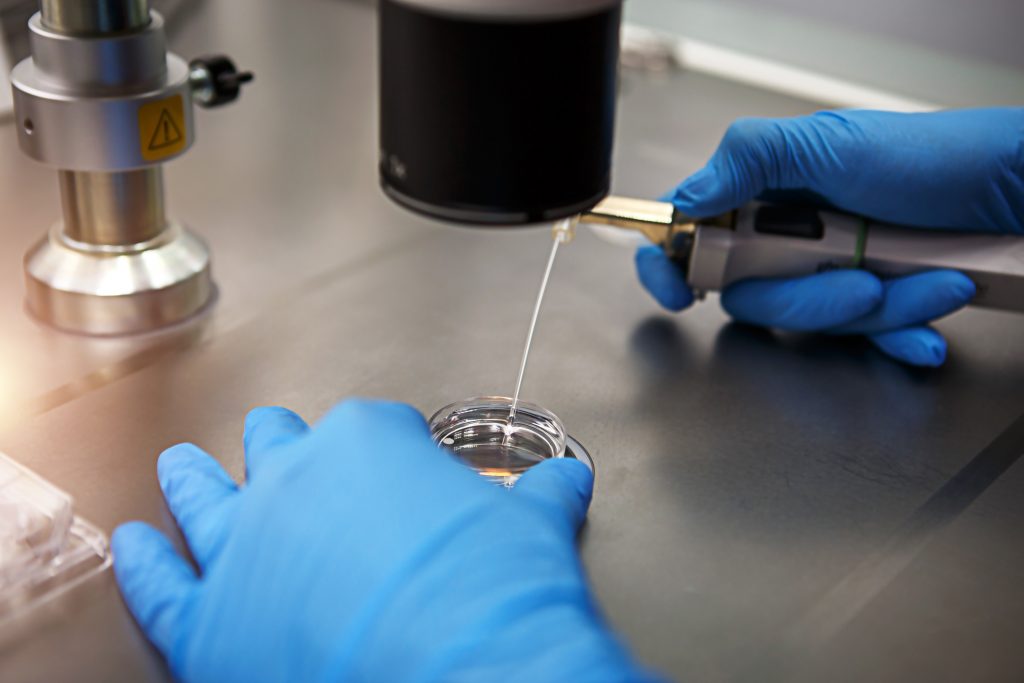
If you’re eager to get pregnant as soon as possible, there is nothing wrong with getting a second opinion. Do your research and find people in your area who have been successful with their in-vitro fertilization.
Some people even went to another country to see the best specialists in this field. Of course, this is just a suggestion, because there are so many couples who think that everyone is good enough to help you to get pregnant.
There are good doctors, but there also are the best doctors. So, give this a second of your time and think about it. However, if you’re confident that your current routine and current set-up are perfect, then all you have to do is prepare for another round. If you’ve been trying for a long time, talk with your doctor and ask for suggestions for other fertility treatments.
Consider a Different Kind Of Therapy
It may sound a bit too much, but individual or couple’s therapy could help you. If you’re someone whose goal is to become a mom, going through in-vitro fertilization can be extremely difficult.
What makes it harder is the fact that is not working. For that reason, talking to a professional therapist could help you to face these hardships. It’s important to stay calm and stable no matter what.
Don’t get me wrong. It’s perfectly fine to be mad and disappointed. But that shouldn’t last forever. If you’re having issues with getting pregnant, you have to heal your mind.
Being positive and hopeful is amazing, but if you aren’t relaxed and at peace, your body will reject the idea of getting pregnant. It sounds like a cliché, but you have to take it easy and see what happens. You have to find balance and learn how to control your inner emotions and tension.
Believing is important, but if you feel that you’re close to the finish line, it’s time to think about this step in your life once more. Maybe you don’t have the money to go through this again. Maybe your health is on the line because of IVF, fertility treatments, or drugs. Maybe you want to forget about pregnancy tests, drugs, and supplements.
Whatever the reason is, sometimes you just know that maybe it’s time to try something else. After all, there are always options. Adoption, surrogacy, donated egg or donated sperm… There are other choices if you’re willing to go down that road. Besides, egg donation and sperm donation are quite common these days.
I hate to think that you’re not interested in trying once more, but I want you to know that it’s okay if you feel that way. Infertility and IVF can drain you completely.
You’re just a human being with feelings, hopes, and dreams. And sometimes all of these things are ruined. Sometimes, you can’t fight for something anymore. That’s okay and you shouldn’t be broken for too long.
You shouldn’t care about what other people think. You’re worthy and special in so many ways. I know that this is your biggest dream, and I want you to keep fighting. But, if you think that this is not the time to keep going, I support you. So many people you don’t even know support you. So many people went through this, and they survived.
Besides, after a while, you will understand that you already have so many great things in life. Love, health, and happiness are present in your life and sometimes, that is truly enough.
Conclusion

I wanted to help you learn more about the positive signs and the day-by-day symptoms after embryo transfer that could happen after this procedure. It’s not complicated to memorize the symptoms and signs. I’m sure you will pick it up in no time.
To be honest, it’s hard to be in a position like you are right now. Infertility is hard to handle. As I’ve said before, your symptoms could mean everything and nothing. Also, the lack of positive embryo transfer symptoms could mean everything and nothing.
If you’re someone who’s preparing for the IVF treatment, I hope that everything I’ve told helped. It’s important to educate yourself about this and it’s important to get your mind straight.
Problems with infertility can seriously damage you. But, you have to be strong and don’t let them break you. There will be ups and downs, but everything in life comes and goes. You will survive this period of your life.
Hi all, I am Sidney, an accountant, a hobbyist photographer, and a mother to two sweet girls who are my motivation. I love sharing the tips and tricks I gained all these years I’ve been a mother. I hope it will help you!

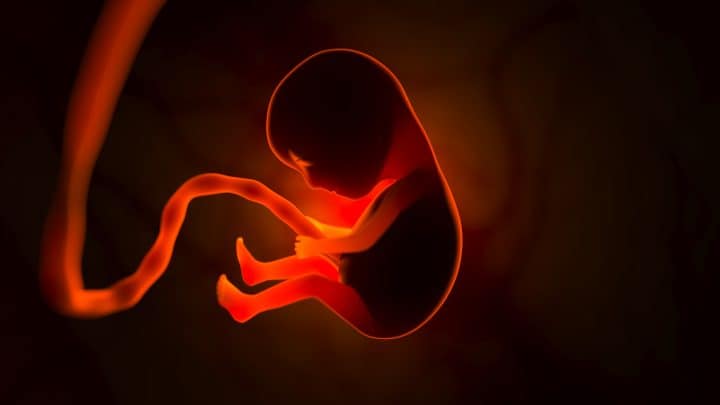
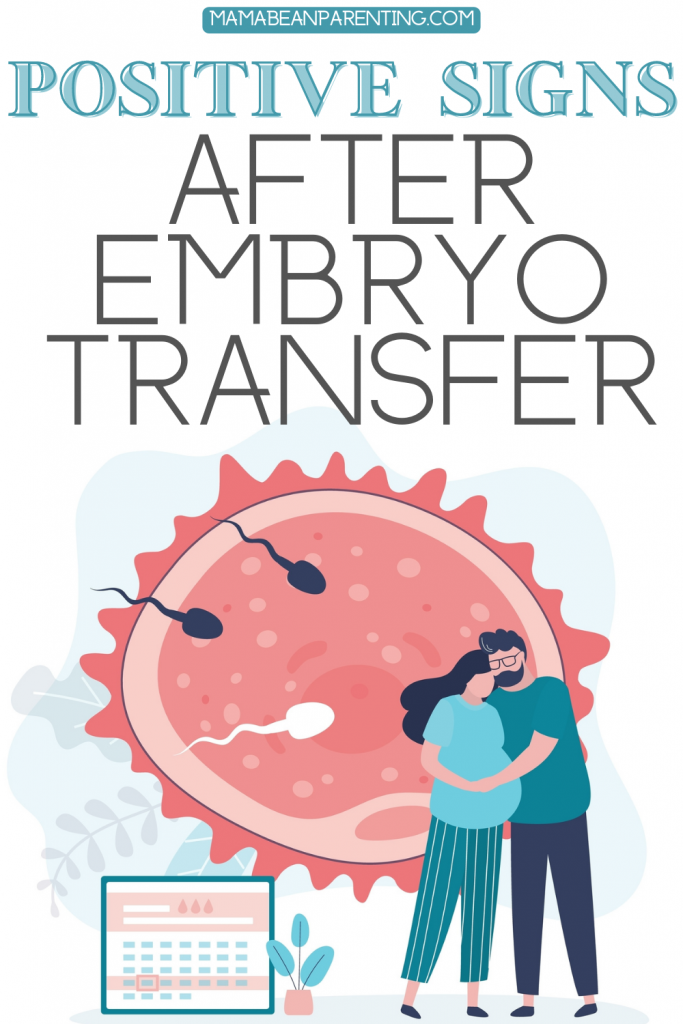
Foods To Help Implantation • Mama Bean Parenting
Friday 10th of February 2023
[…] you went through an embryo transfer, and you’re looking for positive signs after that embryo transfer and IVF treatment – in vitro […]
The 7 Steps To Getting Pregnant With Blocked Fallopian Tubes • Mama Bean Parenting
Wednesday 18th of January 2023
[…] itself to the wall of your uterus in order to become pregnant. Be sure to learn everything about positive signs after the embryo transfer so you could be […]